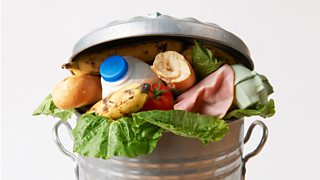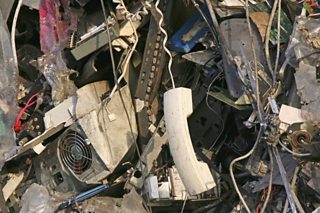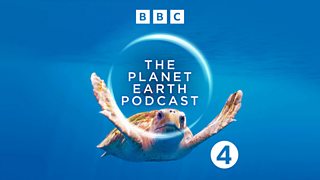Can we live in a world without waste?
We’re in the midst of a global waste crisis, but here in the UK it’s easy to ignore it. In episode two of Βι¶ΉΤΌΕΔ Radio 4 series Rare Earth, Ocean scientist Helen Czerski and journalist Tom Heap uncover the full scale of our problem with waste and ask how we can solve it.
In a programme that’s packed with interesting insights, they visit an abandoned landfill spilling litter into the Thames, and explain why Western clothing is clogging up the sand on Ghanaian beaches. Crucially, they also explore both traditional and cutting edge ways we can slash our waste to protect the planet.
Here are a few highlights from a thought-provoking episode…
Waste is a rapidly growing global emergency
Worldwide, we produce an estimated 2 billion tonnes of solid waste each year, and that’s likely to rise to 3.3 billion tonnes by 2050. Yet the system we use in the UK makes our waste problem almost invisible. We put something in the bin, it’s taken away and we never see it again. (Some landfills even pump out the scent of cotton sheets to mask the smell!)

Waste-hunting journalist Oliver Franklin-Wallace says that this “has kind of hidden… half of the economy.” He explains: “We think an awful lot about where our stuff comes from. Is it organic? Is it fair trade? Is it this or is it that? But we've historically thought very little about its end destination.”
What happens to UK household rubbish?
Most of our bin waste no longer goes to landfill. It’s generally sent to "materials recovery facilities", which extract as many reusable resources as possible. Oliver explains: “They'll take away the metals with magnets and they'll blow out all the paper with fans, and then at a certain point you quite often have teams of people… picking out these materials and separating them out.”
Some things are recycled here in the UK, while others are processed abroad. Oliver says it’s vital that we start seeing rubbish as a resource. “In the waste industry people don't talk about waste, they talk about materials. Those bottles won't just be made into new bottles. They might be made into a new toothbrush or a football shirt or something. So, there's this whole economy for recycled plastics that is kind of exploding.”
Anything from our bins that can’t be salvaged is usually sent to a waste-to-energy plant, where it’s incinerated to generate electricity.
Why landfills are spilling their secrets
Oliver says modern landfill sites are essentially “large, plastic underground bubbles”, designed to ensure that harmful substances don’t escape. But the UK is littered with thousands of older sites that aren’t so secure.

Kate Spencer, Professor of Environmental Geochemistry at Queen Mary, University of London, takes Tom to see a disused landfill that’s being eroded by the Thames, releasing decades-old rubbish. He describes it as “like a geological layer of plastic and cloth and metal and netting and bottles and bags and ropes”. Littering the beach, they find sofa stuffing, polystyrene, asbestos and old batteries that have leaked cadmium, zinc and lithium.
Kate explains that sites like these contain "forever chemicals" that are likely to be there for decades. She says, although we tend to think of our rubbish as being dealt with when we throw it away, “all we've done, really, is just pass that problem on to future generations.”
The poorest people are paying the price
“The waste economy is global,” Oliver explains, with materials being shipped all over the world to be resold, recycled or disposed of. And while this can provide important income for some countries, it also has the potential to do great harm. Oliver says, “It's horrible, poorly paid, dangerous work, and so it tends to follow wherever the lowest wages are and the worst working conditions.”
It’s also about a country’s ability to process the waste it receives. Oliver describes how in Ghana, a landfill site meant to last 30 years was filled in just three with unusable Western clothing donations. It then burned to the ground, leaving some of the world’s poorest people paying off a loan for a facility they couldn’t use.
Is repairing things the answer?
Sarah Swadling visits a repair café in Devon, where volunteers mend everything from clothing to food mixers. Organiser Gill Gale says the work they do is “gradually changing our mindsets to actually care for things.”
It can also be incredibly rewarding. Volunteer Tim says, “We had a gentleman brought in a reel-to-reel cassette… We got it working that day and he heard his dad's voice for the first time in 50 years.”
One big obstacle is built-in obsolescence. This is the idea that companies today don’t design products to be easily repaired, so that people buy the next model when they break. “We have a higher success rate with the older items because they were designed to be serviced,” says Tim.
Turning waste into life-saving pharmaceuticals
Scientists at the Institute of Biotechnology at Manchester University are researching how genetically engineered microbes can create high value substances from rubbish. They’ve developed strains of bacteria that are able to transform waste into insulin to control diabetes, and interferon for cancer treatment.

Researcher Micaela Chacon explains how they can use a huge range of types of waste. “Fundamentally, all of these things are composed of molecules that can be fed to bacteria and they can grow on it and then use those materials to make value products.”
Incredibly, they’ve engineered different strains to create different products, generating what research group leader Neil Dixon calls “wealth from waste”. What’s even more exciting is that they’re making products that would normally rely on fossil fuels. “On the flipside of that, we're also avoiding these waste materials going towards incineration or landfill. So we've got a win-win scenario.”
What can we do to reduce waste?
Helen and Tom conclude waste is a global problem that needs top-down solutions as well as action from everyone. These are a few things we can do as individuals:
- Repair broken items – this doesn’t just reduce rubbish, it stops more waste being created to produce a new item, so it’s doubly impactful.
- Buy less, but better quality – this might be out of reach for those of us on a tight budget, but if you can afford it, spending a little can mean things last longer.
- Take pride in second-hand stuff – help create a culture change, so that more people choose preloved items first and don’t see them as second best.
Listen to Rare Earth here

Essential listening on Radio 4
-
![]()
The Artificial Human
Aleks Krotoski and Kevin Fong answer the questions we're all asking about AI.
-
![]()
The Planet Earth Podcast
Exclusive insights from the acclaimed natural history storytellers that brought us the Planet Earth series.
-
![]()
The Cows are Mad
Science has still failed to definitively answer two major questions about mad cow disease - where did it come from and how did humans get it?
-
![]()
39 Ways to Save the Planet
39 ideas to relieve the stress that climate change is exerting on the planet.





